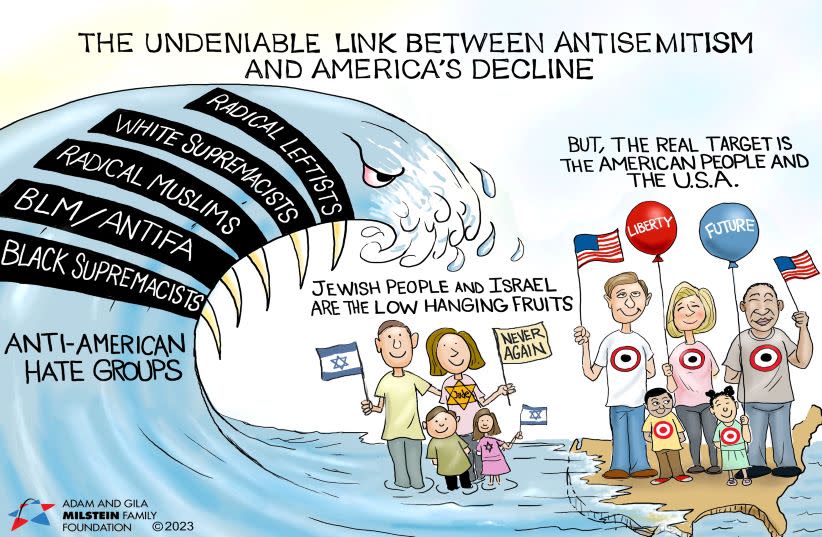Jeffrey Herf: Israel Is Antiracist, Anti-Colonialist, Anti-Fascist (and Was from the Start)
Nor did support for Israel come only from the Soviet bloc. Liberals and leftists in London, Paris, New York, and Washington heard Jamal Husseini, the representative of the Arab Higher Committee to the United Nations, reject a Jewish state in Palestine, because, he said, it would undermine the “racial homogeneity” of the Arab world. Such remarks resonated in a profoundly negative fashion with Americans who had followed the appalling news out of Germany during and after the war. In the Senate, Robert Wagner, a major author of New Deal legislation, extolled the Jewish contribution to the Allied cause. He had already denounced appeasement of the Arabs during the war. With the Allied victory, continuing to appease Arab rejectionism surely made no sense. In the House, Democratic Congressman Emanuel Celler of Brooklyn led efforts to focus attention on Jamal Husseini’s cousin, Haj Amin al-Husseini, the grand mufti of Jerusalem, who had entered into a written understanding with Germany and Italy to “solve the question of the Jewish elements, which exist in Palestine and in the other Arab countries . . . as the Jewish question was solved in Germany and Italy.”Daniel Ben-Ami: Why the world has turned against Israel
The liberal media also took note. Husseini’s collaboration with the Nazis was thoroughly documented in the New York Post as well as in the left-wing publications PM and The Nation, by I.F. Stone, Freda Kirchwey, and the Pulitzer Prize–winning Edgar Mowrer, who urged Husseini’s indictment at Nuremberg. Nevertheless, despite extensive State Department files on Husseini’s collaboration with the Nazis, the American bureaucracy succeeded in resisting efforts to put him on trial and publish its evidence of his Nazi-era activities.
The brief confluence of Soviet and liberal Western sympathies for the nascent Jewish state was brilliantly exploited by Ben-Gurion. He understood better than anyone that it presented a unique moment to bring Israel into existence, with the assent of the world’s two great powers — and that it was an opportunity that would soon close, as indeed it did. During the “anti-cosmopolitan” purges of the early 1950s, Stalin reversed course, spread the lie that Israel was a product of American imperialism, repressed the memory of Soviet support for the Zionist project, and launched a four-decade campaign of vilification against Zionism and Israel. It was one of the most successful propaganda campaigns of the Cold War.
Stalin succeeded in rewriting American history, too. His insistence that it was the Americans and not the Soviets who had wholeheartedly supported the establishment of the State of Israel carried the day. And yet the records of the Departments of State and Defense and the CIA clearly document their emphatic and consequential opposition to the Zionist project.
The differences between the international political landscape of the late 1940s and the one that emerged first in Soviet and then world politics in the 1950s and 1960s need to be reflected in American-Jewish discussions about the establishment of Israel. Contrary to what we’ve heard at the United Nations for decades, in international BDS efforts, and in academic descriptions of Israel, the Zionist project was never a colonialist one.
Just the reverse. The generation that created the state, and its supporters abroad, viewed it as part of the era of liberal and leftist opposition to colonialism, racism, and, of course, antisemitism. The evidence is clear: Whatever faults Israel may have, its origins had nothing to do with American or British imperialism. The argument to the contrary is a conventional unwisdom that has found a home in too much scholarship and journalism of recent decades. Israel’s establishment was not a miracle that eludes historical explanation. It was an episode of enormous moral and military courage for which space was created by canny and hard-headed political leaders in the cause of historical justice — in particular David Ben-Gurion, who seized a fleeting moment, Israel’s moment, to create an enduring achievement.
From Israel's foundation in 1948 through the 1960s, the left generally celebrated Israel as an expression of Jews' right to national self-determination. By the 1990s, however, Western elites started to reject the idea of national self-determination. Yet the denigration of the right to national self-determination undermines the Palestinian cause, too.Stephen Daisley: Why I love Israel
Indeed, many of today's anti-Israel activists aren't really interested in Palestinian self-determination. They are mainly concerned with attacking Israel as a symbol of everything they dislike. This leads them to uncritically endorse Hamas, the leading Islamist representative of the Palestinians, and often Islamism more broadly.
Islamism's goal is not national self-determination, for the Palestinians or anyone else. Rather, it wants to create an international Islamic order. The destruction of Israel - and not the creation of a Palestinian state - is seen as central to achieving that objective. Islamists regard Jews as an expression of "cosmic Satanic evil," who should be physically exterminated if Islam is to flourish.
The Palestinian slogan, "from the river to the sea" (meaning from the Jordan River to the Mediterranean), is popular among both Islamists and Western leftists. Islamists often state openly that they want to murder most if not all of the Jews living there. So when they chant "Palestine should be free," they typically mean free of Jews.
[T]here are plenty of reasons for Zionists to be gloomy on this, Israel’s 75th birthday, but there is one reason for optimism that outshines them all: Israel is 75. Israel was created; survived an immediate Arab effort to annihilate it; ingathered the survivors of the death camps; settled the land and built kibbutzim; struggled through the lean and lonely years; triumphed in the Six-Day War and reunited Jerusalem; pulled through the Yom Kippur War; endured two intifadas; rescued Beta Israel and welcomed the refuseniks; lost Yamit, lost Rabin, lost Gush Katif; made the desert bloom with fruits and microchips; and made peace with Arab nations. All of that in 75 years and, despite impossible odds, Israel lives yet.Israel Independence Day: Celebrating 75 Years with Natan Sharansky
Israel is a hard country and for many a hard country to love. It is flinty but whiny, eager for the world’s love but diplomatically tin-eared, unsentimental but gripped by existential angst. It is a country that adores its army and reveres military discipline but is so hectically informal that you wonder how it made it to 75 days, let alone 75 years. It also boasts the highest density of rude people in the known universe, although I find that strangely endearing. I have never loved Israel more than the time the manager of a Tel Aviv minimart yelled at me for a) not speaking Hebrew, b) being a foreign journalist, and c) coming in to shop when she was trying to watch TV. Only in Israel, the innovation nation, could they invent the inconvenience store.
If Zionism is the theory, Israel is the practice and like all practical translations of idealism it is compromised, haphazard, sometimes unsightly, and occasionally disheartening. But that tension between Zionism and Israel, between ahavat and ha’aretz, is where the great debates take place and where the course of Jewish history can be set or changed. Israeli independence, as it reaches 75 years, is still a miraculous application of a mundane idea: Jewish self-determination.
Former Prisoner of Zion Natan Sharansky's personal journey reflects that of the Jewish people, and the centrality of Israel in his life and Jewish identity mirrors the experiences of so many Jews around the world.
Sharansky: "The existence of Israel and, in a way, the existence of the Jewish people is the best demonstration of the importance of these two basic desires of people - to be free and to belong."
"For a thousand years, what were we fighting for? For our right to live freely in accordance with our identity. And then Israel was established. It could not be created as a non-Jewish state and it would never have succeeded in gathering all the Jews if not for its freedom." "There is no other nation or any other state which embodies the strength of this connection. And if you look at history and compare us with Israel 50 years ago, we have much more freedom and much more identity. We have far more of a Jewish and democratic state, so that's the direction we're heading in....Our history and our triumphs are the best proof of how important it is for these two things to go together." "I grew up [in the Soviet Union] having zero connection with anything Jewish except through antisemitism....It was Israel that came in a very powerful way to the center of our life, from the Six-Day War, and it allowed us to discover our identity, that we have a history, we are a people and we have a state. That gave us the strength to fight for our Jewish rights and for a better world."
"When people simply want tikkun olam [repairing the world] without any identity...your life is very shallow. Look at how all these Birthright kids - whose bar mitzvah was the last time they've had a connection to being Jewish - suddenly discover that it's cool and even interesting to live inside history....Suddenly, they have energy, meaning and understanding....In this age, there is no better way to quickly give Jews a brief injection of the importance and meaning of discovering their Jewish identity than coming to Israel."




































